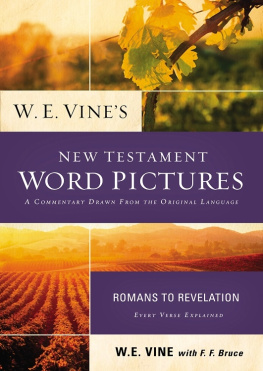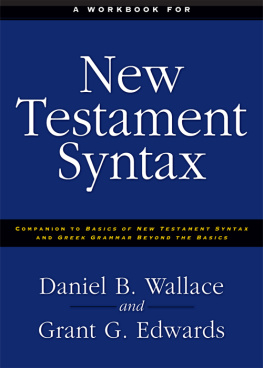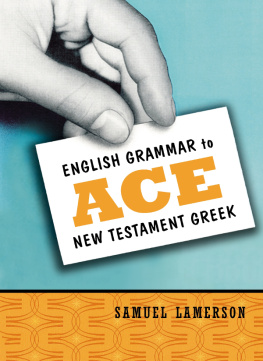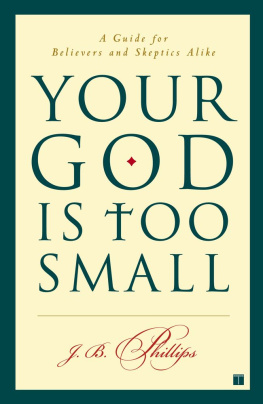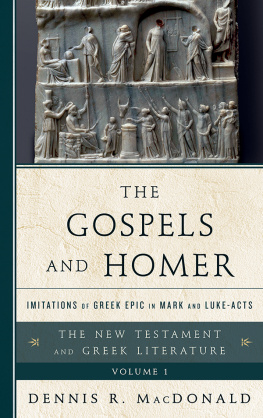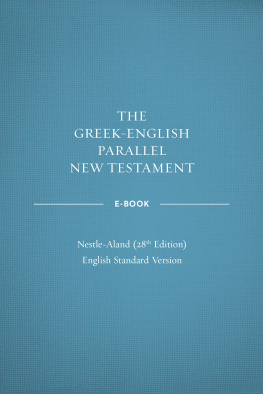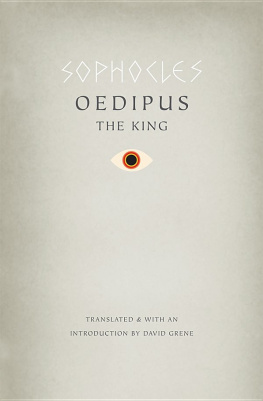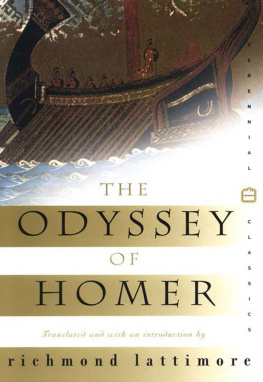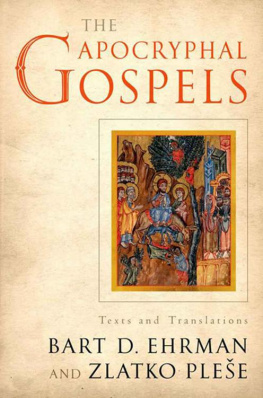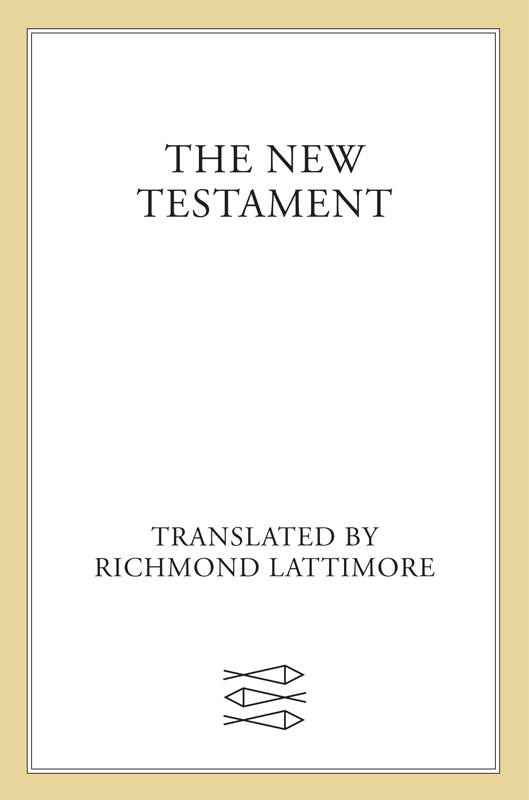Contents
Guide

The author and publisher have provided this e-book to you for your personal use only. You may not make this e-book publicly available in any way. Copyright infringement is against the law. If you believe the copy of this e-book you are reading infringes on the authors copyright, please notify the publisher at: us.macmillanusa.com/piracy.
Contents
It was while I was teaching various Greek texts to beginning students that I was struck by the natural ease with which Revelation turned itself into English. I undertook the translation, and The Revelation of John appeared as a separate volume in 1962. I continued with the Four Gospels, but with many interruptions for other tasks.
I have held throughout to the principle of keeping as close to the Greek as possible, not only for sense and for individual words, but in the belief that fidelity to the original word order and syntax may yield an English prose that to some extent reflects the style of the original. The aim of at least some other contemporary translators has been, avowedly, just the opposite: to be faithful to the sense but to render it in contemporary idiom. This is, of course, a perfectly legitimate aim, and is part of the reason why there is room for a number of modern translations.
Let me illustrate. I have translated Mark 10.27: For men it is impossible, but not for God, since for God all things are possible. I could have written: Men cannot do it, but God can do anything. That says the same thing, but does not reflect the way Mark wrote. At John 11.21 and 32, first Martha, then Mary says: Lord, if you had been here, my brother would not have died. So I translated, and cannot claim originality, for the words are identical with those of the Revised Standard Version. I had thought that so simple a statement could be translated only in this one way. But I have not found it in any other translation that I have consulted.
Consider a more extended passage. For Mark 7.15 I have written: Then the Pharisees gathered to him, and some of the scribes who had come from Jerusalem, seeing that some of the disciples were eating their bread with profane, that is, unwashed, hands: for the Pharisees, and all the Jews, will not eat unless they have washed hand against fist, thus keeping the tradition of their elders; and when they come from the marketplace they will not eat unless they have purified themselves, and there are many other observances that are traditional with them, the washing of cups and vessels both wooden and bronze: the Pharisees and the scribes asked him: Why do your disciples not walk according to the tradition of our elders, but eat their bread with profane hands? Let me try to put this into what is more like a contemporary idiom: The Pharisees, with some of the scribes, went out from Jerusalem to visit him. They noticed that some of his disciples ate without first washing their hands, which made their hands profane. The Pharisees and the Jews in general observe a tradition handed down from their ancestors not to eat without first washing their hands thoroughly. When they come in from the marketplace they will not eat until they have purified themselves. They have many other such traditions, like washing their cups, whether these are made of wood or bronze. Because of all this the Pharisees and the scribes asked Jesus: Why do your disciples disobey our ancestral tradition by eating with profane hands?
Now, other modern translators have modernized this passage much more successfully than I have. My heart is not in this kind of rearrangement of the syntax. Still, all the essential meaning is there. But to me it reads much less like Mark than the version which stands in my translation.
It will follow, or should, that since each of the Gospels, and Revelation, is the work of a different author with a different style, they should read differently in English. I noted that Revelation seemed to translate itself, and my aim has been to let all of my texts translate themselves with as little interference as possible. But it is not always so easy. To go from Revelation to Matthew is like going from Ruskin to Carlyle. Mark in particular offers problems. Since Mark is, by general if not universal consent, the earliest evangelist, we start with his gospel. Matthew and Luke drew on him extensively, but constantly saw fit to rewrite him after their own manners. He can, as illustrated above, be abrupt and crabbed. Also, the nature of the language itself produces difficulties. There are some terms, such as the various forms of skandalon (see note on ), which cannot always be translated in the same way, which really cannot be translated at all, but for which the translator will have to devise some kind of paraphrase which will convey the essential sense.
* * *
The Four Gospels are followed in the New Testament by the Acts of the Apostles, which, though far from being a complete account, is the earliest consecutive story of early Christianity that we have. It can be regarded as a continuation of The Gospel According to Luke. This is implied in the opening sentence, addressed, as is the Gospel, to Theophilus; and there is little or no doubt among scholars that the author is the Luke of the Gospel.
Acts begins with the ascension of Jesus Christ to heaven and the formation of the church in Jerusalem. From there, Christianity is preached abroad by various ministers. In the early part of the story the dominant figure is Saint Peter. The second half of the work, however, becomes almost exclusively the tale of Saint Paul: his missions to the Greek cities of the Roman Empire (the Gentiles), the oppositions he encountered, his arrest in Jerusalem, and his arrival in Rome. Not long after that arrival, Luke somewhat abruptly (as it seems to me) ends his story. Paul spent some time as a prisoner in Rome. He is usually thought to have been martyred during the persecutions of Christians when Nero was Emperor, perhaps in A.D . 64, or on an individual charge before that, but the evidence is not conclusive.
Acts is usually dated with and immediately after Luke, about A.D . 85. That would put it considerably later than Pauls own writings. Still, it is useful to read it first, so as to have a more or less continuous background for Pauls letters.
These, the Epistles of Paul as they are canonically called, are his letters to various Christian communities or churches. They sometimes address themselves to particular problems, but also set forth, again and again, Pauls own theological doctrines and his principles for Christian behavior. There are also four letters to individuals.
For the letters of Paul I have followed a traditional order, but a better sense of time would be gained by reading them in some such order as this: First, letters written before the journey to Rome: First and Second Thessalonians, Galatians, First and Second Corinthians, Romans; and then the letters from Rome: Colossians (with Philemon, to a member of that community), Ephesians, and Philippians.
The two letters to Timothy and the one to Titus are commonly grouped together and known as the Pastoral Letters. Timothy and Titus are well known as associates of Paul, and the letters bear his characteristic self-identification at the beginning. But their authenticity has been seriously questioned. The style and language differ in places from what is characteristic of Pauls other writing, while the three do resemble one another in those respects. First Timothy and Titus speak of the institution of bishops and elders, which seems to point to a later stage in the development of the Church.


